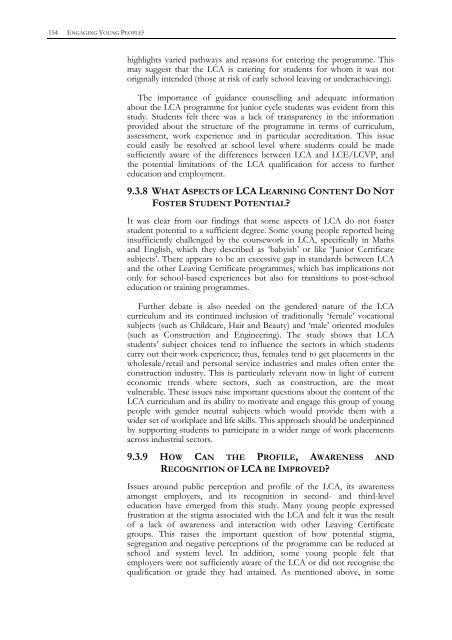Student Experiences of the Leaving Certificate Applied Programme
Student Experiences of the Leaving Certificate Applied Programme
Student Experiences of the Leaving Certificate Applied Programme
Create successful ePaper yourself
Turn your PDF publications into a flip-book with our unique Google optimized e-Paper software.
154 ENGAGING YOUNG PEOPLE?highlights varied pathways and reasons for entering <strong>the</strong> programme. Thismay suggest that <strong>the</strong> LCA is catering for students for whom it was notoriginally intended (those at risk <strong>of</strong> early school leaving or underachieving).The importance <strong>of</strong> guidance counselling and adequate informationabout <strong>the</strong> LCA programme for junior cycle students was evident from thisstudy. <strong>Student</strong>s felt <strong>the</strong>re was a lack <strong>of</strong> transparency in <strong>the</strong> informationprovided about <strong>the</strong> structure <strong>of</strong> <strong>the</strong> programme in terms <strong>of</strong> curriculum,assessment, work experience and in particular accreditation. This issuecould easily be resolved at school level where students could be madesufficiently aware <strong>of</strong> <strong>the</strong> differences between LCA and LCE/LCVP, and<strong>the</strong> potential limitations <strong>of</strong> <strong>the</strong> LCA qualification for access to fur<strong>the</strong>reducation and employment.9.3.8 WHAT ASPECTS OF LCA LEARNING CONTENT DO NOTFOSTER STUDENT POTENTIAL?It was clear from our findings that some aspects <strong>of</strong> LCA do not fosterstudent potential to a sufficient degree. Some young people reported beinginsufficiently challenged by <strong>the</strong> coursework in LCA, specifically in Mathsand English, which <strong>the</strong>y described as ‘babyish’ or like ‘Junior <strong>Certificate</strong>subjects’. There appears to be an excessive gap in standards between LCAand <strong>the</strong> o<strong>the</strong>r <strong>Leaving</strong> <strong>Certificate</strong> programmes, which has implications notonly for school-based experiences but also for transitions to post-schooleducation or training programmes.Fur<strong>the</strong>r debate is also needed on <strong>the</strong> gendered nature <strong>of</strong> <strong>the</strong> LCAcurriculum and its continued inclusion <strong>of</strong> traditionally ‘female’ vocationalsubjects (such as Childcare, Hair and Beauty) and ‘male’ oriented modules(such as Construction and Engineering). The study shows that LCAstudents’ subject choices tend to influence <strong>the</strong> sectors in which studentscarry out <strong>the</strong>ir work experience; thus, females tend to get placements in <strong>the</strong>wholesale/retail and personal service industries and males <strong>of</strong>ten enter <strong>the</strong>construction industry. This is particularly relevant now in light <strong>of</strong> currenteconomic trends where sectors, such as construction, are <strong>the</strong> mostvulnerable. These issues raise important questions about <strong>the</strong> content <strong>of</strong> <strong>the</strong>LCA curriculum and its ability to motivate and engage this group <strong>of</strong> youngpeople with gender neutral subjects which would provide <strong>the</strong>m with awider set <strong>of</strong> workplace and life skills. This approach should be underpinnedby supporting students to participate in a wider range <strong>of</strong> work placementsacross industrial sectors.9.3.9 HOW CAN THE PROFILE, AWARENESS ANDRECOGNITION OF LCA BE IMPROVED?Issues around public perception and pr<strong>of</strong>ile <strong>of</strong> <strong>the</strong> LCA, its awarenessamongst employers, and its recognition in second- and third-leveleducation have emerged from this study. Many young people expressedfrustration at <strong>the</strong> stigma associated with <strong>the</strong> LCA and felt it was <strong>the</strong> result<strong>of</strong> a lack <strong>of</strong> awareness and interaction with o<strong>the</strong>r <strong>Leaving</strong> <strong>Certificate</strong>groups. This raises <strong>the</strong> important question <strong>of</strong> how potential stigma,segregation and negative perceptions <strong>of</strong> <strong>the</strong> programme can be reduced atschool and system level. In addition, some young people felt thatemployers were not sufficiently aware <strong>of</strong> <strong>the</strong> LCA or did not recognise <strong>the</strong>qualification or grade <strong>the</strong>y had attained. As mentioned above, in some

















